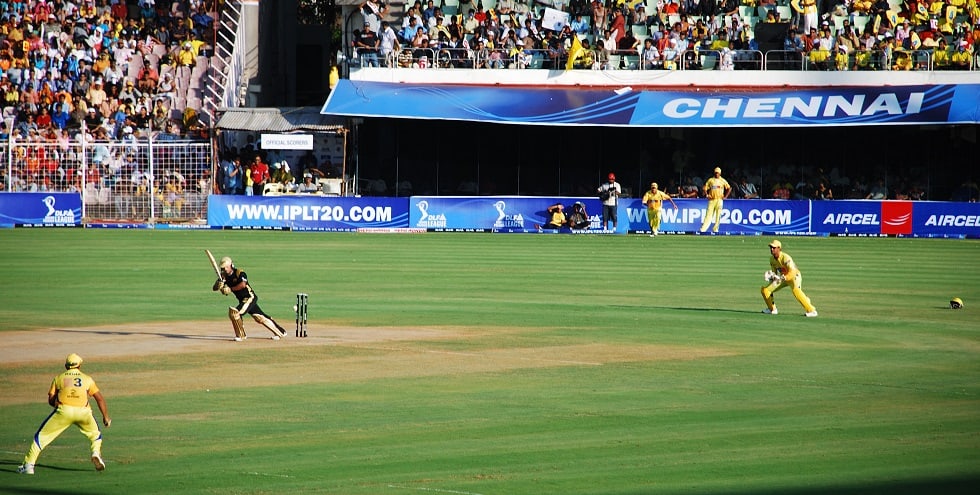Two of the first set of eight teams that made up the Indian Premier League, Chennai Super Kings and Rajasthan Royals ran into a spot-fixing scandal controversy that meant they were left without a competition to play for a couple of seasons.
Rajasthan Royals were the winners of the inaugural edition of the Indian Premier League. Chennai Super Kings were two-time winners and had finished runner-up on four occasions.
And then all of a sudden, they were banned from playing in the Indian Premier League for two seasons.
The spot-fixing mess in the IPL
The 2013 season of the Indian Premier League was its sixth and it turned out to be its most controversial with the game having hit rock-bottom again for the first time since the 2000 match-fixing allegations had surfaced.
In 2012, five players, TP Sudhindra, Shalabh Srivastava, Mohnish Mishra, Amit Yadav and Abhinav Bali had already received bans for their involvement in fixing in the IPL. However, the bigger controversy came in the following season when the Delhi police were involved in tapping a few phone calls that year.
The scandal involved allegations of spot-fixing, illegal betting, and corruption within the league.
Immediately after Rajasthan Royals’ IPL 2013 game against Mumbai Indians, three cricketers, including S Sreesanth, Ankeet Chavan, and Ajit Chandila, who were part of the Rajasthan Royals franchise, were arrested by the Delhi Police for their alleged involvement in spot-fixing matches in that season.
(Sreesanth and Chavan’s ban were later lifted while Chandalia’s life ban was reduced to seven years which ended in 2023).
The scandal unfolded when the Delhi Police revealed intercepted phone conversations between players and bookies, discussing the fixing of specific aspects of matches in exchange for money.
There were arrests made by the Mumbai Police as well, with the likes of actor Vindu Dara Singh, diamond dealer Priyank Sepany and most vitally Chennai Super Kings Team Principal Gurunath Meiyappan called for questioning for alleged cricket betting.
Also Read:
The Mudgal Committee was appointed to investigate into this matter and its final report was presented to the Supreme Court on February 9, 2014. They were asked to probe further and a final report was submitted in November 2014.
Investigations into the scandal exposed a network of bookmakers and fixers who had infiltrated the inner circles of some IPL teams.
It was alleged that players were approached by bookies and offered large sums of money to underperform or manipulate specific moments during matches.
As mentioned earlier, Chennai Super Kings had been one of the most successful franchises in the IPL. It found itself embroiled in controversy after. Meiyappan, a top official of the CSK team and son-in-law of N. Srinivasan, the then-president of the Board of Control for Cricket in India (BCCI), was arrested on charges of betting and spot-fixing.
The investigations revealed that Meiyappan had been in contact with bookies and was allegedly involved in placing bets on IPL matches.
Interestingly, the Chennai Super Kings franchise disowned Meiyappan, calling him just an “honarary member” of the franchise and neither an owner, investor or team principal/CEO.
The reasons for doing this were simple – there was a franchise agreement in place which stated that a team could be immediately terminated if “Franchisee, any Franchisee Group Company and /or any Owner acts in any way which has a material adverse effect upon the reputation or standing of the League, BCCI-IPL, BCCI, the Franchisee, the Team (or any other team in the League) and/or the game of cricket”.
The Meiyappan controversy obviously fell in that purview.
The end-result of the IPL fixing scandal
Forced to take action to restore public trust, the BCCI upheld the integrity of the IPL when in July 2015, the Justice Lodha Committee, appointed by the Supreme Court of India, delivered its verdict on the IPL spot-fixing scandal.
In July 2015, the committee imposed a two-year suspension on Chennai Super Kings and Rajasthan Royals, effectively banning them from participating in the IPL during the 2016 and 2017 seasons.
As a result, Chennai Super Kings and Rajasthan Royals were suspended from the IPL for two seasons – they missed the 2016 and 2017 season in the Indian Premier League. Sunrisers Hyderabad won their first IPL title in 2016 while Mumbai Indians clinched the 2017 tournament.
Also Read:
- Why Did Pakistan Forfeit the Oval Test of 2006?
- Explaining the Batting & Bowling Strike-Rate in Cricket
Why were CSK & RR suspended for two years?
The main reason behind the suspension of Chennai Super Kings and Rajasthan Royals was the betting activities around their key personnel, Meiyappan and Raj Kundra respectively.
To go with the suspensions of the teams, Meiyappan and Kundra were banned for life for their role in “bringing the IPL and the game to disrepute”.
for their role in “bringing the IPL and the game to disrepute”.
As mentioned earlier, Sreesanth, Chandila and Chavan were banned from the tournament and never played again despite their life bans having been lifted by the BCCI later.
In February 2016, ICC umpire and Pakistan’s Asad Rauf was found guilty of being involved in corruption as well and banned for five years. He had been charged in 2013 but opted not to go to Mumbai to face them.
The ICC had opted to suspend Rauf from international umpiring too and he never umpired in any aforementioned games after 2013.
A score of bookmakers in the country were also arrested in connection with this scandal.
Rajasthan Royals co-owner Raj Kundra was also arrested for his alleged involvement and according to reports, he had admitted to having placed bets in the Indian Premier League . He was suspended from the IPL.
. He was suspended from the IPL.
The suspensions of CSK and RR sent shockwaves through the cricketing world and marked a significant turning point in the history of the IPL.
The scandal served as a wake-up call for cricket administrators and stakeholders, highlighting the urgent need for robust measures to combat corruption and uphold the spirit of fair play in the sport.
The Mudgal Committee report
The final report submitted by the Mudgal Committee into the 2013 IPL spot-fixing controversy in November 2014 also contained a sealed envelop from their previous findings in February. This envelop consisted of 13 names and the fraud allegations against them but weren’t released to the public because of the sensitivity of the information.
This report mentioned the names of N Srinivasan, the former BCCI chief and Chennai Super Kings co-owner, Meiyappan, Kundra and IPL COO Sundar Raman for various related misdeameanours.
The Lodha Committee Report
The Lodha Committee was appointed by the Supreme Court in January 2015 following the report submitted by the Mudgal Committee. This committee’s main purview was to announce the quantum of punishments for those allegedly entangled in the fixing affair.
It announced life bans from cricketing activities for Meiyappan and Kundra and two year suspensions for Chennai Super Kings and Rajasthan Royals. They had earlier heard arguments from the lawyers of all those involved but refused to use any of them as mitigating factors.
What happened to the players from these two suspended teams?
There were scores of players who featured for these two teams but weren’t involved in any spot-fixing or cheating.
With their teams banned, there were question-marks raised about their future but the BCCI made a provision for them to be either picked up by the two new teams in the IPL or to be released back to the auction from where they were picked up by the other teams.
The BCCI introduced two new teams for the competition, Gujarat Lions and Rising Pune Supergiants and they were both allowed a pick of five players apiece from those available from the Super Kings and the Royals in a specially-held draft for these two teams alone.
The introduction of these two teams was for two years only, the 2016 and 2017 IPL seasons. These were the players who were selected via this Draft.
- Rising Pune Supergiants: Mahendra Singh Dhoni, Ajinkya Rahane, Ravichandran Ashwin, Steve Smith, Faf du Plessis
- Gujarat Lions: Suresh Raina, Ravindra Jadeja, Brendon McCullum, James Faulkner, Dwayne Bravo
Photo Credit: Chandrachoodan Gopalakrishnan – Own work

